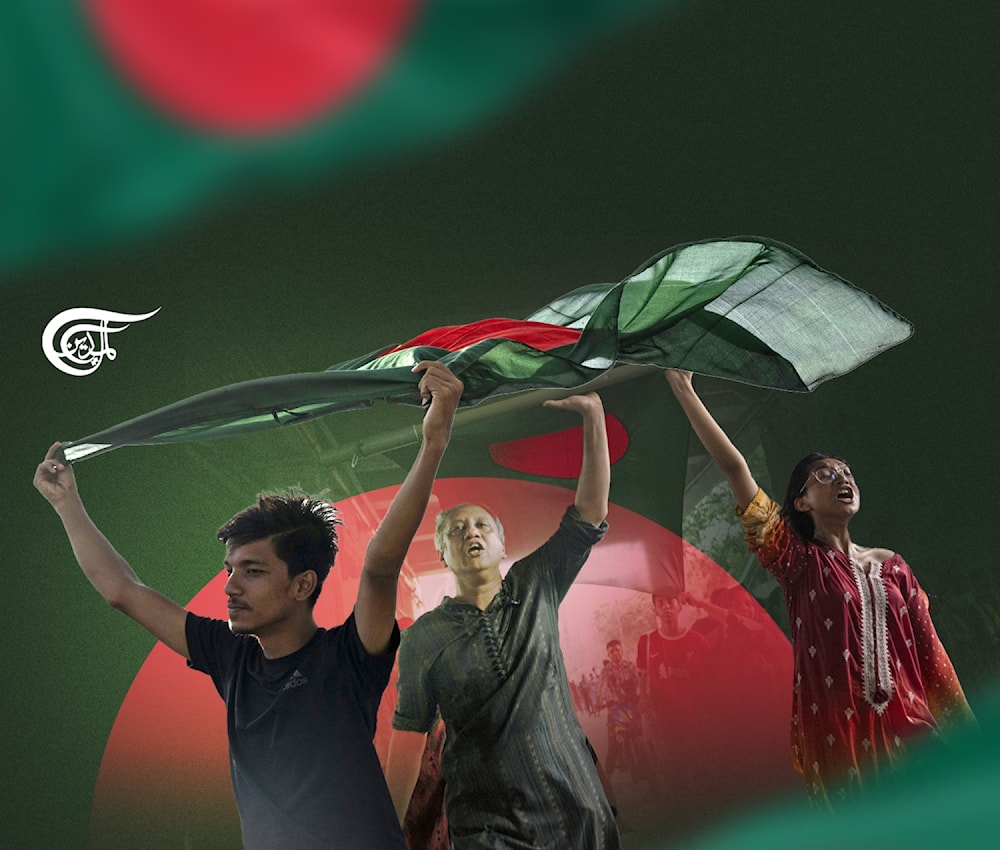From Democratic Hero to Autocratic Ruler: The Resignation of Hasina Wajid
One of the key indicators of her shift towards autocracy was the 2014 and 2024 elections, which were marred by allegations of widespread voter suppression and manipulation.
-

From Democratic Hero to Autocratic Ruler: The Resignation of Hasina Wajid (Illustrated by Mahdi Rteil to Al Mayadeen English)
Hasina Wajid, once celebrated as a beacon of hope and a champion of democracy in Bangladesh, has resigned, marking the end of a controversial era. Her journey from a pro-democracy icon to an autocratic ruler encapsulates the tumultuous political landscape of the country and raises significant questions about the nature of power and governance.
Hasina Wajid’s political journey began with promise and inspiration. She emerged as a staunch advocate for democracy and human rights in the late 20th century, following the assassination of her father, Sheikh Mujibur Rahman, the founding leader of Bangladesh. With a vision to restore democracy and fight authoritarian rule, Hasina galvanized public support and led her party, the Awami League, to victory in the 1996 elections. Her leadership was seen as a fresh breeze in a country yearning for democratic governance and stability.
In her early years in power, Hasina Wajid implemented significant reforms aimed at improving the economy, education, and healthcare. Her administration's efforts to enhance women’s rights and social welfare programs earned her accolades both domestically and internationally. Under her leadership, Bangladesh made strides in achieving higher literacy rates and economic growth, solidifying her reputation as a progressive and forward-thinking leader.
However, as her tenure progressed, cracks began to appear in Hasina Wajid’s democratic facade. Accusations of corruption, nepotism, and election rigging started to surface. Critics argued that her government was increasingly using state machinery to suppress opposition voices and curb dissent. The judiciary, media, and civil society organizations began to feel the weight of governmental pressure, with many instances of censorship and intimidation coming to light.
One of the key indicators of her shift towards autocracy was the 2014 and 2024 elections, which were marred by allegations of widespread voter suppression and manipulation. Sheikh Hasina's party, the Awami League, has secured a fourth consecutive term in the 12th parliamentary election, which recorded the second lowest voter turnout since democracy was restored in 1991, according to the Daily Star. The main opposition party boycotted the election, leading to a landslide victory for the Awami League but raising serious doubts about the legitimacy of the electoral process. Subsequent elections only reinforced these concerns, with international observers highlighting numerous irregularities and abuses of power.
As her government grew more repressive, public discontent simmered beneath the surface. Protests became more frequent, with citizens demanding greater transparency, accountability, and an end to authoritarian practices. The dismantling of democratic institutions and the erosion of civil liberties led many to view Hasina Wakid as a ruler more interested in maintaining power than upholding the democratic principles she once championed.
Amid escalating violence that has claimed around 300 lives in two weeks, Bangladesh Prime Minister Sheikh Hasina resigned and fled to India, landing in Agartala. The country is experiencing its worst violence in history, with lethal force used by police against protesters. Bangladesh Army Chief General Waker-uz-Zaman announced the formation of an interim government to restore peace and investigate the recent killings, urging citizens to trust the army. The turmoil, triggered by job quota protests despite economic growth, reflects deep-seated social unrest and dissatisfaction with Hasina's autocratic governance, media curbs, and a crackdown on political rivals.
International human rights organizations, including Amnesty International, have expressed deep concerns about the rise of fascism under Sheikh Hasina's regime, citing harassment of dissenting journalists, writers, intellectuals, and teachers. The misuse of laws such as the Digital Security Act (2018) and the Info & Communication Technology Act (2006) has led to the arrest of over 2,200 individuals, severely restricting freedom of expression. The decline in media freedom is stark, with Bangladesh falling from 121st to 162nd in the RSF World Press Freedom Index since 2009, reflecting an increasingly repressive environment for journalists under Hasina's leadership.
Domestic issues in Bangladesh are affecting historical perspectives, particularly regarding the 1971 independence from Pakistan. Sheikh Hasina's resignation raises questions about her father's legacy and India's role in the war. Various analysts argue that India's involvement was motivated by strategic interests rather than pure altruism, challenging the view of India as Bangladesh’s liberator and suggesting that it exploited the situation to weaken Pakistan and boost its own regional power. The resignation also revives debates about the Pakistan Army's actions during 1971, with some suggesting that current issues in Bangladesh under Hasina’s rule validate Pakistan’s historical positions and question the simplicity of the narrative blaming Pakistan. Hasina’s close ties with India have led to accusations that her government prioritized Indian interests over Bangladesh’s sovereignty, contributing to the discontent leading to her resignation. This moment offers an opportunity for Bangladesh to reassess its historical narratives and governance issues, striving for a balanced understanding of its past while moving towards a democratic and just future.
In a nutshell, the perpetrators of the recent brutalities in Bangladesh must face justice and be held accountable. The new government has an opportunity to achieve this by inviting the UN to form a commission of inquiry and fully cooperating with the process. The international community should also advocate for this to uphold global justice and accountability. The success of the new leadership will hinge on the trust and confidence it can build with the people. The interim and subsequent governments will face significant challenges in stabilizing the economy and recovering the state amid global economic and political chaos. The only way out of this volatile situation is by ensuring public participation in decision-making and transitioning to a democratically elected, transparent, and accountable government as soon as possible.

 Saima Afzal
Saima Afzal
 6 Min Read
6 Min Read





